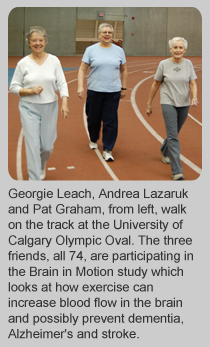
January 5, 2011
Story and photo by Chris Simnett
Pat Graham, Andrea Lazaruk and Georgie Leach began their nursing careers together in 1954.

Today, the Calgary women – friends since they met at age 18 in the nursing school residence at the Holy Cross Hospital – are embarking on another health care adventure.
They’re participating in the Brain-in-Motion Study, which looks at the relationship between exercise, blood flow in the brain and thinking/memory skills.
“Our hypothesis is that when you exercise, the blood flow to your brain increases, improving your thinking and memory skills, and protecting you from dementia, stroke and Alzheimer’s disease,” says study lead Dr. Marc Poulin, a member of the Hotchkiss Brain Institute in the faculties of Medicine and Kinesiology at the University of Calgary and a senior scholar with Alberta Innovates - Health Solutions.
Graham, Lazaruk and Leach are all celebrating their 75th birthdays in 2011 and have first-hand knowledge of the devastating affects of dementia, stroke and Alzheimer’s.
Leach and Graham had family members with Alzheimer’s, while Lazaruk’s time as a home care nurse for Alberta Health Services gave her a closeup look at how an individual’s cognitive loss affects not only that person but his or her family as well.
“Alzheimer’s is a really hard thing to go through for everyone involved,” says Leach.
“Watching my sister deteriorate after she was diagnosed with the disease in 2007 was a devastating experience.”
By participating in the study, Leach, Lazaruk and Graham hope to protect themselves from developing dementia and Alzheimer’s, or having a stroke. They also hope the information gathered by the study researchers will help others.
“I want to get this brain in motion,” says Leach with a laugh. “We’re doing this study to help ourselves. We want to know how to keep ourselves healthy.”
The study hopes to recruit 250 Calgarians (125 women and 125 men) between the ages of 55 and 75. Participants receive a free six-month membership to the University of Calgary Fitness Centre and support from the study’s fitness trainer.
Each participant spends 18 months in the study. The first six months are spent taking a series of baseline measurements: a standard set of cognitive memory and thinking skill tests, measurement of blood flow in the brain using Doppler ultrasound, and a graded exercise test to determine each participant’s fitness level.
The middle six months are spent on an exercise plan in which each participant walks or jogs for 45 minutes three times a week. In the final six-month phase of the study, the tests from the first phase are repeated.
“We know that exercise plays an important role in brain health,” says Poulin. “This study will help us better define the specific impact of exercise and how well it works in boosting brain blood flow and cognition.”
For more information on the study or to join, contact Natalie St-Denis, Project Manager, at 403-210-7315 or email nstdenis@ucalgary.ca.
The study is supported by Alberta Innovates - Health Solutions, the Canadian Institutes of Health Research, the Brenda Stafford Foundation, the Heart and Stroke Foundation of Canada and the Canada Foundation for Innovation.